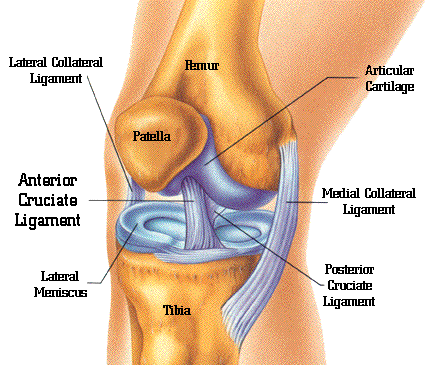Sport Rehabilitation and Physiotherapy for Medial Collateral Ligament (MCL) Sprains

What is the Medial Collateral Ligament (MCL)?
The ligament on the inside of the knee that stabilises and resists inward and twisting movements.
What Causes a Medial Collateral Ligament (MCL) tear?
It is usually injured when the knee is forced inward or twisted too far beyond its limit causing disruption or a tear. There are three grades of injury:
1 – minor tearing of a few fibres of the ligament
2 – partial tear of several fibres of the ligament
3 – complete rupture of all fibres of the ligament
In severe cases, it may be part of a complex injury including damage to the anterior cruciate ligament and cartilage.
What are the Symptoms of a Medial Collateral Ligament (MCL) tear?
Pain on the inside of the knee made worse by inward or twisting movements with decreased mobility. Swelling may be mild or severe and bruising may develop a few days after the injury occurs.
What will treatment consist of for a Medial Collateral Ligament (MCL) tear?
Massage – Encompassing a variety of techniques with sufficient pressure through the superficial tissue to reach the deep lying structures. It is used to increase blood flow, decrease swelling, reduce muscle spasm and promote normal tissue repair.
Deep friction – An aggressive massage technique applied across the tissue as deeply as possible to break down scar tissue, restore normal movement and prepare the structure for mobilisation or manipulation. This technique is initially painful but then causes a numbing effect.
Mobilisation – A manual technique where the joint and soft tissues are gently moved by the therapist to restore normal range, lubricate joint surfaces and relieve pain.
Ultrasonic Therapy – Transmits sound waves through the tissues stimulating the body’s chemical reactions and therefore healing process, just as shaking a test tube in the laboratory speeds up a chemical reaction. It reduces tissue spasm, accelerates healing and results in pain relief.
Interferential Therapy – Introduces a small electrical current into the tissues and can be used at varying frequencies for differing treatment effects. E.g. pain relief, muscle or nerve stimulation, promoting blood flow and reducing inflammation.
What other treatments could be used for a Medial Collateral Ligament (MCL) tear?
Acupuncture – An oriental technique of introducing needles into the skin to increase or decrease energy flow to promote pain relief and healing.
Injection Therapy – A specialist procedure during which a non-harmful steroid and local anaesthetic are injected directly into the injured structure. It has a dramatic effect on removing inflammation and promoting healing.
Taping/Strapping – May be used if thought necessary to restrict abnormal movement and prevent further damage.
What can you do yourself to help a Medial Collateral Ligament (MCL) tear?
Active Rest – Keep active but avoid activities that aggravate your condition i.e. any activity that may put a twisting or sideways strain on the knee.
Apply an ice pack – For a maximum of 20 minutes. A bag of frozen peas wrapped in a damp cloth works well because it moulds to the shape of the tissues. Ensure that you do not apply ice directly to the skin as this can cause an ice burn.
Exercise programme – This is the most important part of the rehabilitation. Your therapist will instruct you as to which exercises to begin with, when to add the others, as well as how to progress the exercises.
Medication – Ask your GP or Pharmacist for advice on the best medication for your condition.
Podiatry – An analysis of the foot mechanics and structure during walking or running and correction as appropriate.
What if physical therapy does not help or resolve a Medial Collateral Ligament (MCL) tear?
It is very rare that treatment does not resolve this condition. In these cases we will refer you on for further investigation.
If you think you may have this condition we would love the opportunity to show you our expertise in the treatment and management of this condition so – Please click here for details of how to contact us to book an appointment
If you are unsure whether you have this condition or you would just like to speak to somebody then please get in touch here or call 0161 745 7551 or 0151 515 2323.
